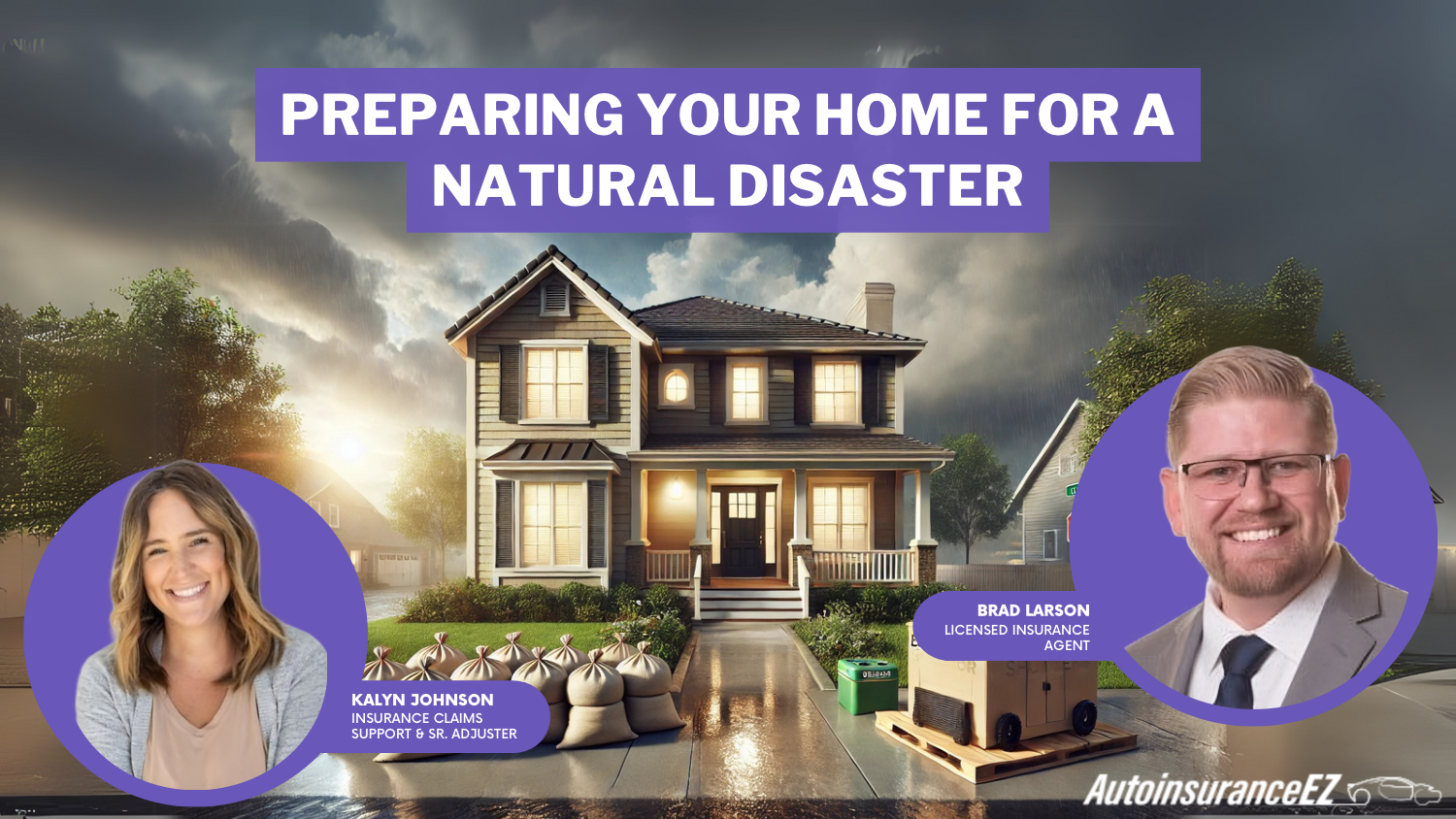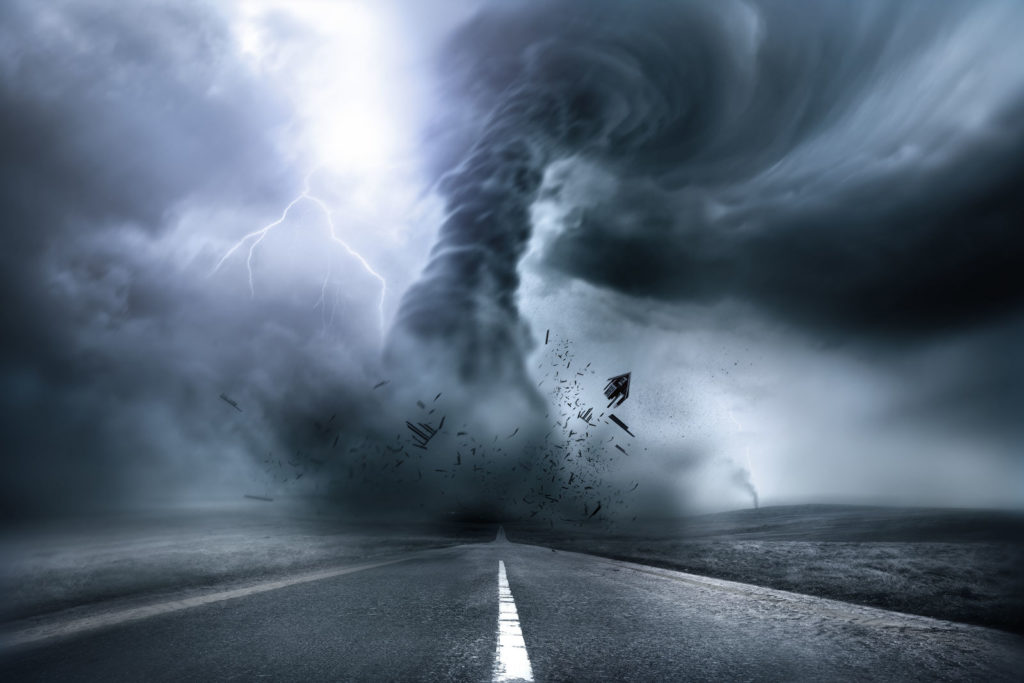Preparing Your Home for a Natural Disaster
Free Auto Insurance Comparison
Compare Quotes From Top Companies and Save
Secured with SHA-256 Encryption

Brad Larson
Licensed Insurance Agent
Brad Larson has been in the insurance industry for over 16 years. He specializes in helping clients navigate the claims process, with a particular emphasis on coverage analysis. He received his bachelor’s degree from the University of Utah in Political Science. He also holds an Associate in Claims (AIC) and Associate in General Insurance (AINS) designations, as well as a Utah Property and Casual...
Licensed Insurance Agent
UPDATED: Mar 10, 2025
It’s all about you. We want to help you make the right coverage choices.
Advertiser Disclosure: We strive to help you make confident insurance decisions. Comparison shopping should be easy. We partner with top insurance providers. This doesn’t influence our content. Our opinions are our own.
Editorial Guidelines: We are a free online resource for anyone interested in learning more about auto insurance. Our goal is to be an objective, third-party resource for everything auto insurance related. We update our site regularly, and all content is reviewed by auto insurance experts.
UPDATED: Mar 10, 2025
It’s all about you. We want to help you make the right coverage choices.
Advertiser Disclosure: We strive to help you make confident insurance decisions. Comparison shopping should be easy. We partner with top insurance providers. This doesn’t influence our content. Our opinions are our own.
On This Page
Preparing Your Home for a Natural Disaster

Natural disasters can occur at any time, and often do so without warning. They can leave people stranded without food, water, or communication, while chaos and confusion overwhelm first responders.
It’s important to prepare your home for an emergency such as a power outage, a flood, or a snowstorm so that you and your loved ones can stay safe. Having a plan of action can also help to make disasters manageable and survivable.
Before any storms head your way, be sure your home is protected with insurance. Use our free tool to compare the best policies in your area.
Read more: How to Prepare for an Emergency
Create an Emergency Plan
Panic makes any situation worse. A clear head during an emergency can make all the difference.
Develop a Plan
Get together with family members or roommates and develop an emergency plan. Make sure everyone knows the different safe places in the house for each type of disaster. For instance, the basement is usually the best place to hide from a tornado because of its lack of windows.
Find Your Nearest Shelter
If the house is unsafe, consider which disaster shelter is the closest for a meeting place, and which route is the fastest to take. In the event of a hurricane, everyone will need to know the best escape route.
Delegate Tasks
If medication is required, or if pets need to be kept safe, assign each family member a specific task so that no one person has too much to remember. If responsibilities are divided up, there is less room for error.
Communicate
Communication is key in an emergency, and it’s a good idea to have various forms of contact. If there is a snowstorm and cell service is down — families will need a way to stay in touch.
Walkie-talkies are a good backup because they are battery-powered and use radio waves for two-way communication.
Make sure everyone in the family is aware of the plan and responsibilities, and always have a backup plan, just in case.
Enter your ZIP code below to compare auto insurance rates.
Secured with SHA-256 Encryption
Pack a Home Emergency Kit
Emergency preparedness kits are essential. During a natural disaster, stores may close or the roads may be too dangerous to drive, leaving no way to attain food or water. Oftentimes people have an emergency kit for their car, but it’s resourceful to make one specifically for the home.
Make sure to build two different kinds — a travel-ready kit, in case of an evacuation, and a more robust one that stays at the house. Some key items to put in an emergency kit are:
- Water
- Nonperishable food
- Blankets
- Matches
- Flashlights
- Medication
- Batteries
- Portable chargers
- Extra socks
- First aid kit
Keep this kit in a safe, dry space to ensure it will be ready for use. Individual items can be stored in airtight plastic bags, while the whole kit can be kept in a waterproof duffle bag, which will be easy to take in an evacuation.
Safely Store Important Documents
Important documents are a crucial detail in case hospital records or any other type of records get destroyed. These documents include:
- Birth certificates
- Social security cards
- Passports
- Wills
- Deeds
- Home insurance policies
Store these documents properly — in a safe, a filing cabinet, or a waterproof – or even fireproof – container. For added protection, take pictures and store them in a secure file.
Prepare for a Variety of Disasters
With a variety of natural disasters, preparing for several different scenarios is pertinent. Each response is determined by the type of disaster. For instance, the response to a snowstorm should differ from the response to a flood.
Plan for disasters that are relevant to the area where you live. A tropical residence won’t need to worry much about a blizzard. However, some disasters can happen anywhere, like fires or power outages, so be prepared for those types as well.
Verify that your home insurance policy covers damages to the house, the property, and belongings inside the house.
This kind of policy is designed to financially protect the home against natural disasters. Policies can differ from state to state, so it’s important to know what is covered.
Enter your ZIP code below to compare auto insurance rates.
Secured with SHA-256 Encryption
Stay Informed
Staying informed is one of the best ways to be prepared.
Mobile apps, like FEMA, send weather alerts, emergency information, safety tips, and local resources to help navigate a natural disaster, even away from home.
Another tactic is to opt for emergency alerts via text message from the Wireless Emergency Alert (WEA) public safety system. These texts include extreme weather alerts, amber alerts, and presidential alerts, with special tones and vibrations to distinguish from regular text messages.
While some disasters typically strike with little to no warning (like earthquakes), there are other situations you can anticipate. The more time you have to prepare, the better. Communities or neighborhoods may also have disaster plans in place, which are helpful to know in evacuations.
It’s important to stay informed after a natural disaster as well. In some cases, communities aren’t safe to return to, and authorities will need you to stay away until debris is cleaned up and the roads become accessible.
Create a Recovery Plan
A recovery plan that takes into account the aftermath of a natural disaster is just as important, as it is the least understood aspect of an emergency. As mentioned before, some communities won’t be safe to return to, so families need a meeting place other than their house. Even if the disaster plan was followed, it can still have a huge impact — mainly on your house.
Determine where the family is meeting. After everyone is safe, take an inventory of the emergency kits. Restock anything low, as some stores could be closed for a while.
Then contact the home insurance agent to start a claim. It’s better to do this sooner rather than later since the house might be damaged and unlivable.
Another way to create a recovery plan is to look for a disaster recovery center in your area. These centers can help people apply for FEMA assistance, find housing and rental information, and get referrals to other agencies that could help.
Natural disasters can happen at any time, and while they aren’t preventable, they are actionable.
Knowing where to evacuate, stocking emergency kits, and having a plan can make a huge difference in handling and recovering from a natural disaster.
Is your home properly protected by homeowners insurance? If not, enter your zip code to get a free quote now.
Enter your ZIP code below to compare auto insurance rates.
Secured with SHA-256 Encryption
Brad Larson
Licensed Insurance Agent
Brad Larson has been in the insurance industry for over 16 years. He specializes in helping clients navigate the claims process, with a particular emphasis on coverage analysis. He received his bachelor’s degree from the University of Utah in Political Science. He also holds an Associate in Claims (AIC) and Associate in General Insurance (AINS) designations, as well as a Utah Property and Casual...
Licensed Insurance Agent
Editorial Guidelines: We are a free online resource for anyone interested in learning more about auto insurance. Our goal is to be an objective, third-party resource for everything auto insurance related. We update our site regularly, and all content is reviewed by auto insurance experts.

